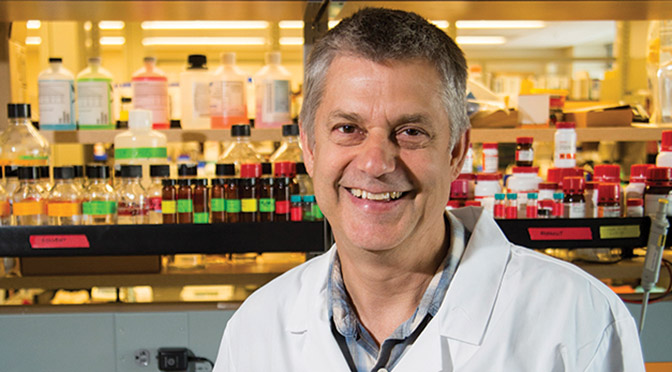What are you currently working on?
My current research is on bacterial cell-wall biosynthesis, which is the target of many of our most effective antibacterial agents – such as penicillin. My background was in the areas of enzymology and bio-organic chemistry. I started my research career by looking for an area of high biomedical significance and long-term prospects in which to apply my background. Bacterial cell-wall biosynthesis seemed ideal, given the increasing risks posed by antibiotic resistant bacteria then (25 years ago).
We study how current cell-wall-targeting antibiotics and how bacteria become resistant to antibiotics. We are also working on developing new agents targeting this process. Given the well-known health threat posed by antibiotic-resistant bacteria, our research has considerable potential to inform current efforts to address this problem and provide new agents and solutions.
What has been an important finding?
We have identified and characterized one new antibacterial agent – D-boroAlanine – that has good broad-spectrum antibacterial activity, but not quite good enough for consideration as a clinically useful agent. Some of our mechanistic observations on the regulation of resistance to cell-wall-targeted antibacterial agents suggest strategies to counter antibacterial drug resistance, and we have started discussions with clinical faculty in the UMKC School of Medicine on the possibility of evaluating these strategies.
How do you incorporate research projects into student learning?
The only way to learn how to research is by doing it. That is how my graduate students learn their trade. I also give our pharmacy students a hands-on opportunity through research to treat various bacteria with antibiotics and observe their response, or lack of response, when resistant.
I also established and am in charge of our school’s mass spectrometer core facility, and one of my goals is to maximize the impact of this resource at UMKC. One of my recent students, Harika Vemula, Ph.D., developed skills in mass spectrometry as applied to biological systems and just started a new position as a research scientist at Harvard Medical School running a mass spectrometer facility for a group of cancer researchers. It is one of the top cancer research centers in the world. Her work there will likely contribute to new cancer treatments that will emerge over the next 10 to 20 years, which will then be used to treat patients in this area.
Why is UMKC research important to Kansas City and the region?
Research contributes immensely to our current standard of living and our health. Kansas City is a major hub for agricultural research, which depends on a technically trained workforce. Research at UMKC contributes to both of these needs, and research discoveries often provide the foundation for new enterprises, which enhance the economic development of the region.
How is your research relevant to the public?
Drug-resistant bacteria are a huge public health threat. Several bacterial pathogens have now become resistant to nearly every agent available and have become essentially untreatable. It is urgent that we develop new drugs and new drug use strategies, to address this threat. We must also use existing antibiotics more carefully in the future in order to slow resistance to the effective agents we still have left in our arsenal.



